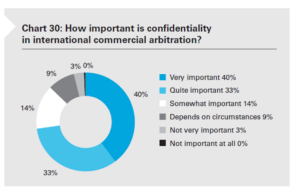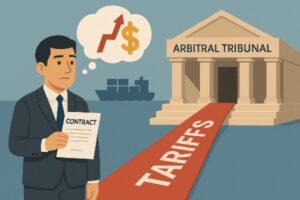As every arbitration practitioner knows, securing a favourable arbitral award is often the culmination of months, or even years, of effort. Parties invest substantial time, money, and energy in arbitration to resolve their disputes. When an arbitral tribunal finally delivers a positive decision, it may feel like the hard work has paid off. Yet, in […]
International Arbitration Law
Confidentiality in International Arbitration
Traditionally, confidentiality is one of the perceived advantages of international arbitration as opposed to State court proceedings.[1] The underlying rationale behind confidentiality in international arbitration comes from the need to ensure a “dispassionate dispute resolution process” between the parties.[2] In fact, parties choose international arbitration in order to benefit from a unified, neutral, efficient, and […]
Global Supply Chains, Tariffs and the Role of International Arbitration
The use of international arbitration for tariff-related disputes is becoming increasingly relevant as the Trump administration’s tariffs disrupt global supply chains, trigger commercial instability, and generate a wave of cross-border conflicts. Trump’s Tariff Policy and the Disruption of International Supply Chains Tariffs are defined as customs duties on merchandise imports.[1] They are often used to […]
Data Protection in International Arbitration
In an era where data is a new form of currency, safeguarding sensitive information is an essential consideration in international arbitration. At the same time, data protection laws of the world have rapidly expanded in scope to the point that, according to Gonçalves and Brancher, “there is no area of law that is not impacted […]
Cartels and International Arbitration
Cartels disrupt market integrity and harm economic players. As companies worldwide face increasing risks from the anti-competitive practices of cartels, international arbitration is emerging as a critical tool for resolving these disputes. Understanding Cartels: The Basics A cartel is an agreement or coordinated action between two or more competitors, typically entities offering similar goods or […]
Arbitration and Long-Term Contracts
The importance of long-term contracts in various industries has grown significantly. These agreements feature an extended duration, exhibit complexity, and establish interconnected reliance between the parties. Long-term contracts often govern relationships in sectors such as mining, telecommunications, and oil and gas, where cooperation over a prolonged period is essential. Given the extended nature of these […]
Taxation of International Arbitration Awards
The taxation of damages in international arbitration awards should be a significant consideration for any party embroiled in an arbitrable dispute. According to Keller and Leikin, the average tax liability in cases heard before tribunals established under the International Convention for Settlement of Investment Disputes (the “ICSID”) is an eye-watering USD 16-38.5 million.[1] Nevertheless, the […]
Arbitration of Shareholder Disputes
Shareholder arbitration is a mechanism that permits parties to resolve shareholder-related disputes. Arbitration of shareholder disputes allows parties to resolve their conflicts outside of courts, using neutral arbitration, in an efficient and confidential way. There is a wide range of disputes that emerge between shareholders and between shareholders and the company, including disputes related to: […]
Asymmetrical Arbitration Clauses
Asymmetrical arbitration clauses are those which afford more rights to one party than to another. For example, whilst a typical symmetrical arbitration agreement would provide that all parties must submit a dispute to arbitration, an asymmetrical clause would give one party the option of choosing between arbitration and litigation whilst binding the others to its […]








